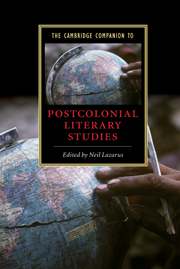1 - Introducing postcolonial studies
Published online by Cambridge University Press: 28 August 2006
Summary
Before the late 1970s, there was no field of academic specialization that went by the name of “postcolonial studies.” Today, by contrast, postcolonial studies occupies a position of legitimacy and even relative prestige, not only within the Euro-American academy but also in universities in many countries of the formerly colonized world. Postcolonial studies centers have been set up in many institutions - mostly linked to departments of literature but inviting significant input also from scholars based in cultural studies, history, anthropology, art, and other disciplines - and innumerable conferences and colloquia have been convened. Advertisements for academic positions in postcolonial studies have become fairly routine. Several dedicated academic journals have begun publication, and any number of other journals have devoted special issues to “postcolonial literature,” “postcolonial theory, ” or “the postcolonial condition.” Literary anthologies and critical readers, as well as compilations of essays in the field, have been published, and many of these have sold very well.1 And in addition to the hundreds of scholarly books and thousands of critical articles that might be said to be in the field or indeed to make it up - from the works of Edward W. Said, Homi K. Bhabha, Benedict Anderson, V. Y. Mudimbe, Peter Hulme, and Gayatri Chakravorty Spivak to the mass of less influential work on particular authors, periods, situations, events, and concepts - there has recently emerged a burgeoning production of scholarly texts that take the critical field itself as their object.
- Type
- Chapter
- Information
- Publisher: Cambridge University PressPrint publication year: 2004
- 16
- Cited by

